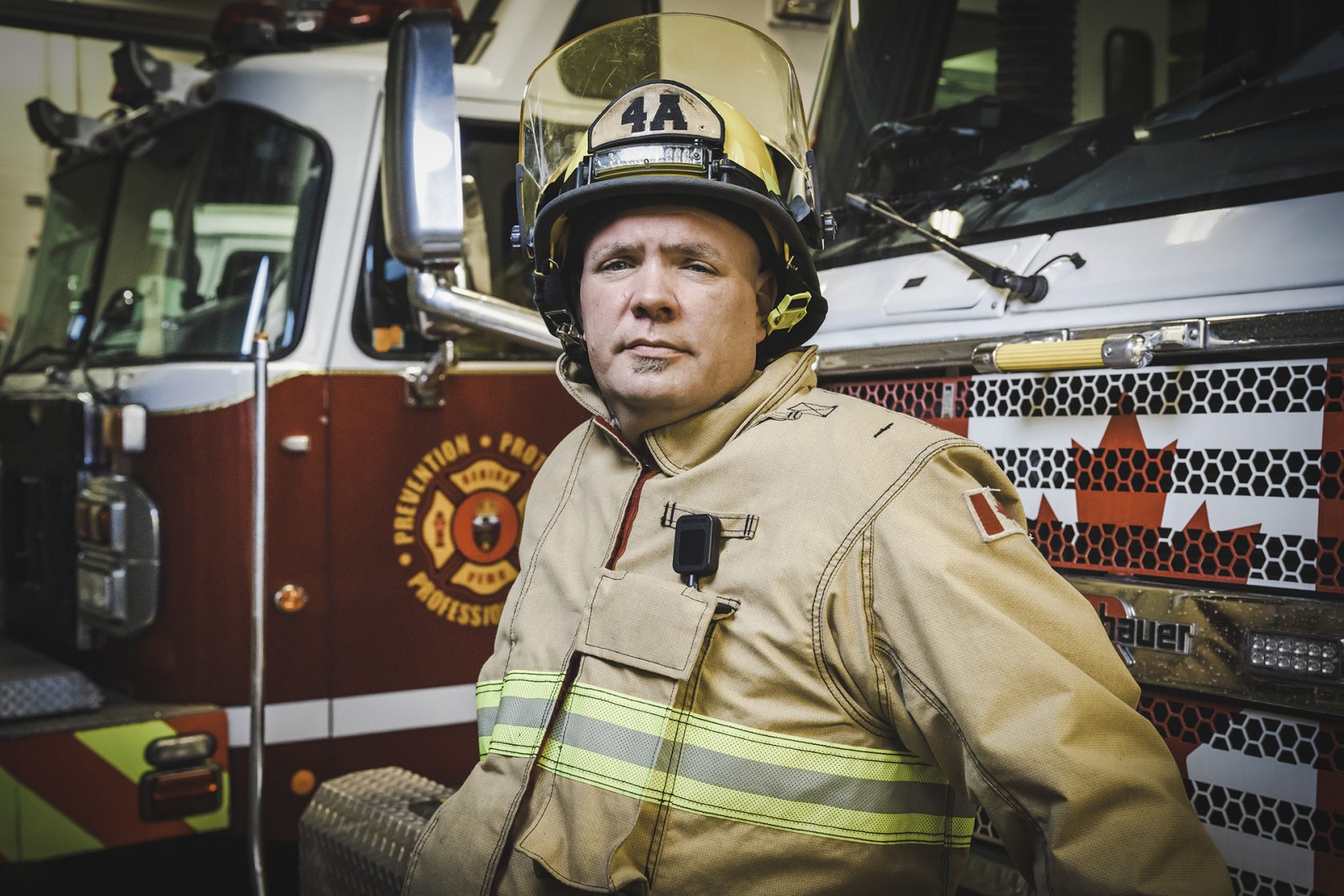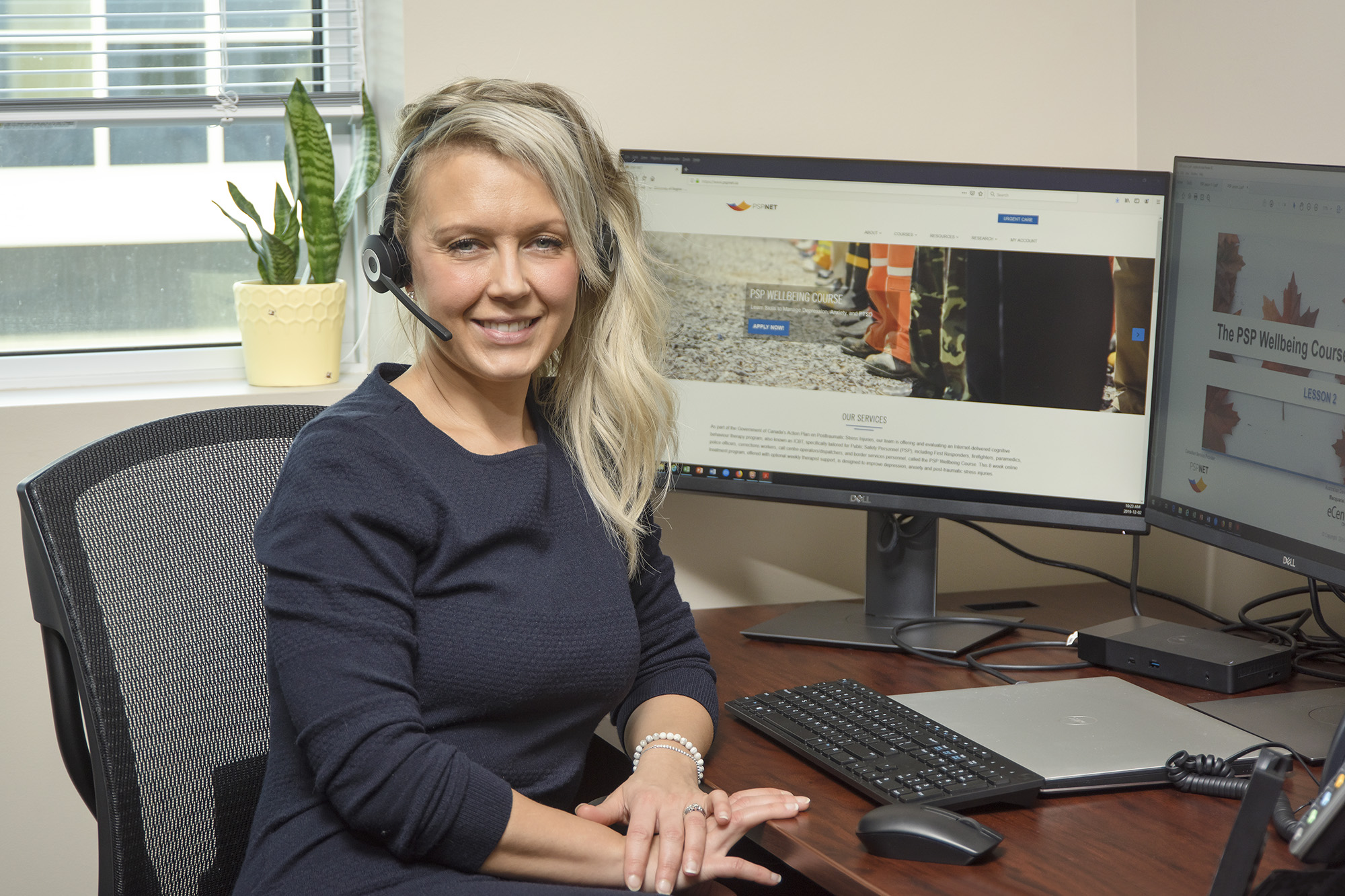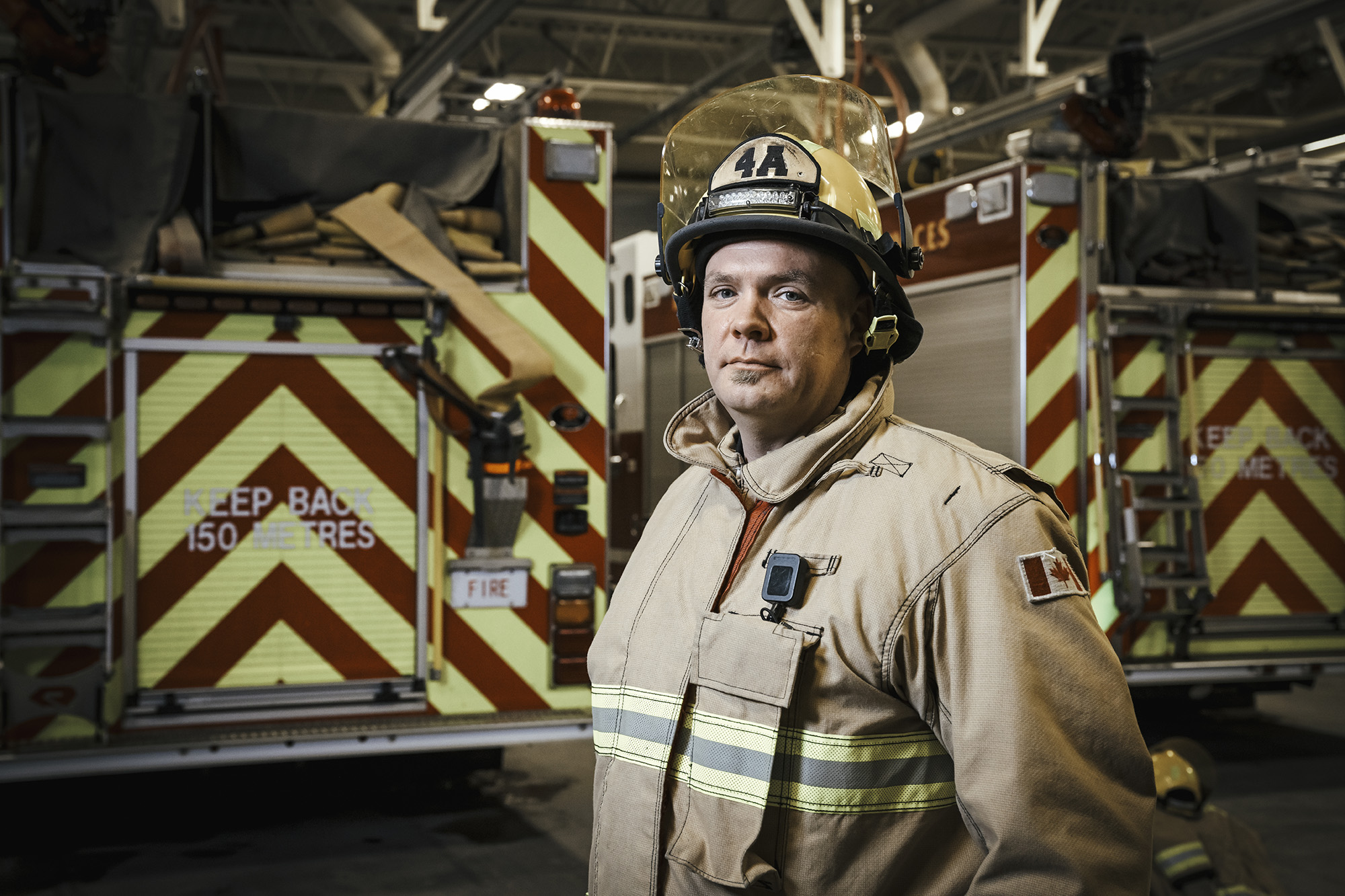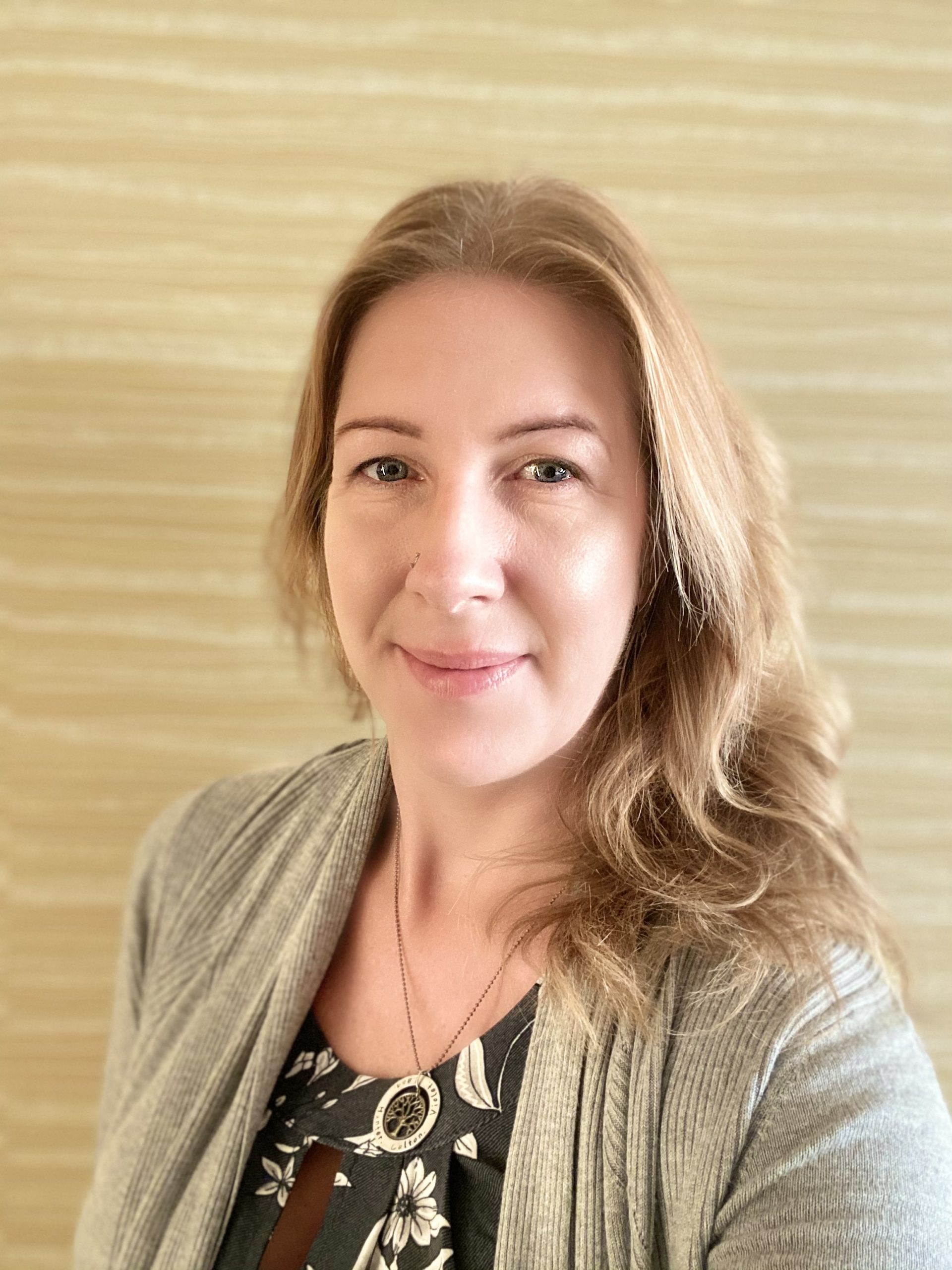Online therapy is helping to protect the mental health of public safety personnel and their families.

The first time he experienced an anxiety attack, Todd Frei was about to share a eulogy at the funeral of a friend who died by suicide. His heart started racing, he started sweating, and he felt dizzy. The 44-year-old Regina firefighter remembers thinking: “These are all signs of a heart attack.”
The next time Frei felt those same symptoms, he was sitting in a union meeting. Again, that same hot and flushed feeling and racing heart. Rather than tell one of his EMS-trained colleagues, he hopped in his truck and started driving home. En route, he made a quick turn, and drove himself to Emergency at Pasqua Hospital.
The nurse at triage quickly ushered Frei into an exam room. Doctors ran a battery of tests. Results turned up no evidence of a heart attack. The attending physician asked Frei what had been going on in his life. He explained that his buddy had just died by suicide, that his daughter had recently started having epileptic seizures, and that his mother-in-law was dying in hospital. “Sounds like maybe you’re experiencing an anxiety or panic attack,” she said. “You should probably get some counselling.”
He didn’t, and ended up in Emergency a second time, where they once again confirmed that nothing was wrong with his heart. Frei eventually accessed a therapist through his Employee Family Assistance Program. She helped him see the patterns of thinking he was stuck in. When he started to feel the physical sensations, his mind would take off and start thinking the worst: I’m having a heart attack. What’s going to happen if I have a heart attack? Am I going to be able to provide for my family?
PSPNET: What is it?
While Frei eventually sought help, there are a host of reasons – poor access, cost, stigma – why many public safety personnel can’t or don’t seek support for mental-health concerns. In an attempt to overcome those barriers to seeking care, a pilot project called PSPNET was launched at the University of Regina in 2019 that offers firefighters, police, corrections workers, EMTs, and other public safety personnel a different avenue for accessing mental health support.
The goal is to support those who put their lives on the line to keep our communities safe.
Through PSPNET, they can access cognitive behavioural therapy (CBT) over the internet, wherever they want, whenever they want.
CBT is an evidence-based form of psychotherapy that helps people change their patterns of thought and behaviour. With ICBT (internet-based cognitive behavioural therapy), clients review treatment materials online, while also having access to a therapist who provides support, typically via secure email exchanges and phone calls.
The very nature of their jobs means that public safety personnel are regularly – sometimes on a daily basis – exposed to traumatic events, which leads to high rates of mental health difficulties, especially depression, anxiety, and post-traumatic stress disorder (PTSD). A 2017 survey conducted by a multi-disciplinary team of Canadian researchers at the Canadian Institute for Public Safety, Research, and Treatment (CIPSRT), located at the University of Regina, found that nearly half of public safety personnel screened positive for a clinically significant symptom for at least one mental health disorder, compared to one in ten in the general population.
“When you’re young, you think about being a police officer or firefighter or paramedic, and it seems very exciting. New recruits are ill-equipped to deal with what is coming.”
For Dr. Heather Hadjistavropoulos, who was instrumental in bringing PSPNET to life, the goal is to support those who put their lives on the line to keep our communities safe. “They work really hard for us. They put themselves at risk,” says Hadjistavropoulos, who is one of Canada’s leading scholars on ICBT and also founded the Online Therapy Unit at the U of R in 2010.
Dr. Jody Burnett is a registered doctoral psychologist and an adjunct professor in the Department of Psychology at the University of Regina. She provides support to public safety personnel who seek PSPNET services and has years of experience offering therapy to first responders and their families. She doubts most people fully appreciate the huge risk of psychological injury that public safety personnel face every shift. “When you’re young, you think about being a police officer or firefighter or paramedic, and it seems very exciting,” says Burnett. “New recruits are ill-equipped to deal with what is coming.”

There’s a cumulative effect of regularly being exposed to psychologically damaging events, says Burnett. “If you imagine you’ve got a bucket, over time that bucket gets full of stuff. And if people don’t have a way to empty that bucket out regularly or process what’s in that bucket or get support, that’s when we see people get into a crisis situation.”
PSPNET, which operates within the Canadian Institute for Public Safety Research and Treatment, is funded through the Government of Canada’s National Action Plan on Posttraumatic Stress Injuries. While there’s plenty of evidence demonstrating the effectiveness of ICBT, this is the first time the approach has been systematically applied to meeting the unique needs and issues faced by public safety personnel.
PSPNET started in Saskatchewan in December 2019, then expanded to Quebec in June 2020. In November 2021, PSPNET was offered to those in Nova Scotia, New Brunswick, and PEI, thanks to additional funding from the Medavie Health Foundation and the governments of these Atlantic provinces.
The eight-week courses include self-assessment tools and learning modules. There’s a general wellbeing course that equips public safety personnel with strategies for dealing with the most common concerns many face, including depression, anxiety, PTSD, and anger. PSPNET also offers a course that is tailored specifically to those experiencing PTSD.
The wellbeing and PTSD courses are therapist-guided and provide participants with access to a therapist by phone or secure email. A self-directed version of the wellbeing course became available to public safety personnel across Canada in December 2021.
PSPNET is built on foundational research conducted by Hadjistavropoulos in the Online Therapy Unit, in collaboration with researchers from Macquarie University in Sydney, Australia. Treatment materials were then tailored to include stories and examples based on interviews with more than 100 individuals working in public safety in Canada.
Since PSPNET launched, public safety personnel have continued to provide feedback and suggestions, all of which have been used to add to the stories and examples and create additional resources specific to public safety personnel.
For example, for a police officer who’s feeling anxious about having to go to court to testify, there are anonymous examples of how the strategies taught in the course have been used by other officers and been found helpful. “Or if you’re getting criticism from the public, these are some of the thoughts you’re probably going to be having, and here are some of the ways you work through those thoughts,” says Hadjistavropoulos.
“For many people, PSPNET seems to be a better pathway,” says Burnett. “One that’s more user friendly. It doesn’t require a diagnosis. It doesn’t require involvement from your employer. It doesn’t require money."
University of Regina graduate student Hugh McCall has been involved with PSPNET from the start. The focus of his master’s thesis was a field called persuasive design, which essentially posits that if you design interventions to be more interesting and engaging for people, they are going to have better outcomes. With PSPNET, he’s now leading research on the effectiveness of an online discussion forum as a tool for improving participant engagement and outcomes in the self-directed wellbeing course.
McCall is excited by the possibilities that ICBT holds for applying persuasive design. “When you look at this field of research, it’s still very much in its infancy. There's a lot of work to be done to make these interventions better, particularly as technology progresses,” says McCall. “There is a tonne of potential to create interventions that ultimately are going to have a more positive impact on people’s lives. That’s really what motivates me.”
The barriers of in-person counselling
PSPNET, with its online format, provides another care option that addresses many of the barriers public safety personnel can face in getting support. Shift work, the reality for most public safety personnel, can make it challenging to get in to see a therapist quickly and regularly. Most therapists or counsellors work a typical nine-to-five day. With PSPNET, treatment materials can be accessed at any time.
Stigma is another obstacle that PSPNET overcomes.

Some public safety personnel don’t want colleagues or people in their community to see them visiting a therapist. “That scares the hell out of people because for many, this is more than just a job,” says Burnett. “This is part of who they are. It’s a scary thing to step out and admit or acknowledge that you need help.”
“If disclosing a mental health problem might actually impact how you feel people perceive you at work, that will limit people going for care,” says Hadjistavropoulos. “Public safety personnel are trained to be strong and larger than life, so what that means is that there’s also this higher tendency to try to manage mental health problems on their own rather than seek help.”
Privacy can be a bigger obstacle for public safety personnel working in rural areas, where they’re more likely to know the people who would be providing them with care, she says. Not to mention the fact that there are fewer mental health supports available outside urban centres.
“For many people, PSPNET seems to be a better pathway,” says Burnett. “One that’s more user-friendly. It doesn’t require a diagnosis. It doesn’t require involvement from your employer. It doesn’t require money.”
Looking back, Frei says it would have been great to have had access to the program when he first started experiencing anxiety symptoms eight years ago.
Results so far
While their initial funding was recently extended to March 2025, Hadjistavropoulos and the team are seeking more money to further extend and expand the program. Results thus far would suggest more financial support is warranted.
To date, more than 1,000 public safety personnel from across the country have participated in the program, across all sectors, and with a good balance of gender, which is important, says Hadjistavropoulos. “In face-to-face care, it’s a much higher proportion of women who come for support, but it’s both men and women who are public safety personnel.”
There has also been strong participation by public safety personnel working in smaller, rural centres (under 90,000 population) which Hadjistavropoulos considers a good sign, given that this group generally has a tougher time accessing mental-health care.
As of the end of January 2023, 773 public safety personnel from across Canada had started therapist-guided ICBT. To date, over 511 have concluded treatment. In terms of outcomes, 72 per cent of participants with depression experienced a clinically significant improvement in symptoms, 77 per cent with anxiety experienced improvement, and 74 per cent with PTSD had improvement. In satisfaction surveys completed after eight weeks, 98 per cent of participants reported that they’d refer a friend to PSPNET. And the same proportion felt the program was worth the time they invested. Ninety per cent said PSPNET had improved or greatly improved their confidence in managing symptoms of their mental-health problems.
Among the first 100 users of the eight-week self-directed program, 75 completed a satisfaction survey. A very promising 93 per cent of these respondents said they’d recommend PSPNET to a friend.

For Regina firefighter Todd Frei, the nights were the worst. No sooner would he lay down than a negative thought would pop into his head. “Before you know it, it’s three o’clock in the morning, and now I’m anxious because I haven’t had any sleep and I’ve got to work in the morning,” says Frei. “And I’m thinking, ‘I’m gonna be tired and I’m gonna mess up an address going to a call.’”
He completed the PSPNET course in 2020.
“The course gave me a bunch of strategies for maintaining my mental health.” Looking back, Frei says it would have been great to have had access to the program when he first started experiencing anxiety symptoms eight years ago.
PSPNET Families: Supporting the families of first responders
In 2007, when Melissa Scheltgen’s husband started working as a federal correctional officer, she recalls that the motto was essentially: “You signed up for this job, you deserve what you get. Payday is every second Wednesday.”
It wasn’t long before she started noticing changes in her spouse, subtle at first, then gradually more pronounced. He was increasingly hypervigilant, his mood a bit darker, his fuse a little shorter. With Melissa’s help and support, her husband took time off work and assembled a care team. He eventually left corrections entirely.
A registered social worker, Scheltgen remembers feeling there was nowhere for her to turn, no one to talk to. “I went into caregiving mode, where I was acting not as a therapist to my husband, but playing this case management role, making sure emails were responded to, and paperwork completed, while also caring for our children. But what I didn’t do was care for my own mental health.”

She remembers feeling angry. Angry at the system for allowing her husband to be hurt psychologically. Angry at her husband for not recognizing that he was in trouble. Angry at herself for not acting on the warning signs sooner. “I jumped right into action mode. So any other feelings that I was wrestling with really got pushed to the side, as I made sure that all his appointments were scheduled, that we got to them, and that he got well.”
Recently the Public Health Agency of Canada provided funding to create PSPNET Families as a complement to PSPNET. The project is led by three co-principal investigators, including Hadjistavropoulos who is overseeing the creation of a version of the self-guided wellbeing course for spouses of public safety personnel.
Scheltgen – who joined PSPNET as a clinical research associate in 2021 – jumped at the chance to be part of the pilot examining the effectiveness of a self-guided ICBT program among spouses facing some of the same struggles she had.
“Public safety personnel families are often held up as the first responders to first responders.”
PSPNET Families recognizes that being a partner or family member of public safety personnel can take a heavy toll on a person’s mental health and wellbeing. They need attention because of the unique things that they experience living alongside a public safety personnel member, says Dr. Nathalie Reid, director of the Child Trauma Research Centre at the University of Regina, and a co-principal investigator with PSPNET Families. “Public safety personnel families are often held up as the first responders to first responders,” says Reid. “Our feeling is that this is an incomplete positioning, given the experiences and struggles public safety personnel families live with and face in their own right.”
Dr. Heidi Cramm is an associate professor in the Faculty of Heath Sciences at Queen's University. She leads the Family Matters Research Group – an international group of interdisciplinary researchers who study families of people working in the military and the public safety sector. She’s also, like Reid, a co-principal investigator with PSPNET Families. Married to a firefighter, she has 30 years of first-hand experience with the issues faced in public safety personnel households.
It’s a constant juggling act, she says. “How do you manage the kids? How do you manage your own career? How do you manage all of the transportation needs for your kids and their extracurriculars when at random points – and that is the tough part – when at dynamic fluctuating points, your other half is not there? How do you create that family life where you’re completely self-sufficient without that person and have a very meaningful connection when you’re together?”
Meeting their needs
Reid sees PSPNET and PSPNET Families filling an unmet need, as a complement to, rather than in competition with, existing mental-health supports. She hopes the two initiatives continue to grow and evolve in response to what the research team is learning from participants.
And she sees all sorts of possibilities down the road.

“Wouldn’t it be amazing to have a space on the PSPNET Families website for kids? And wouldn’t it be great to think about ways that what we’re learning can be used to support people working in other sectors? My field is education, so I see all kinds of connections between the work I’m doing with – and for – educators. I also see possibilities for health-care workers.”
Burnett says PSPNET and PSPNET Families are important tools for a unique sector of the population – tools that are helping keep public safety personnel and their families from having to suffer in silence.
“We’re only just beginning to see the impact these two programs are having on the mental health and wellbeing of public safety personnel and their families,” says Burnett. “I’m proud that we’re helping to support those who are always there to support us when we need them, and I’m so happy we’re finally able to return the favour – to them and their families.”












